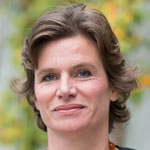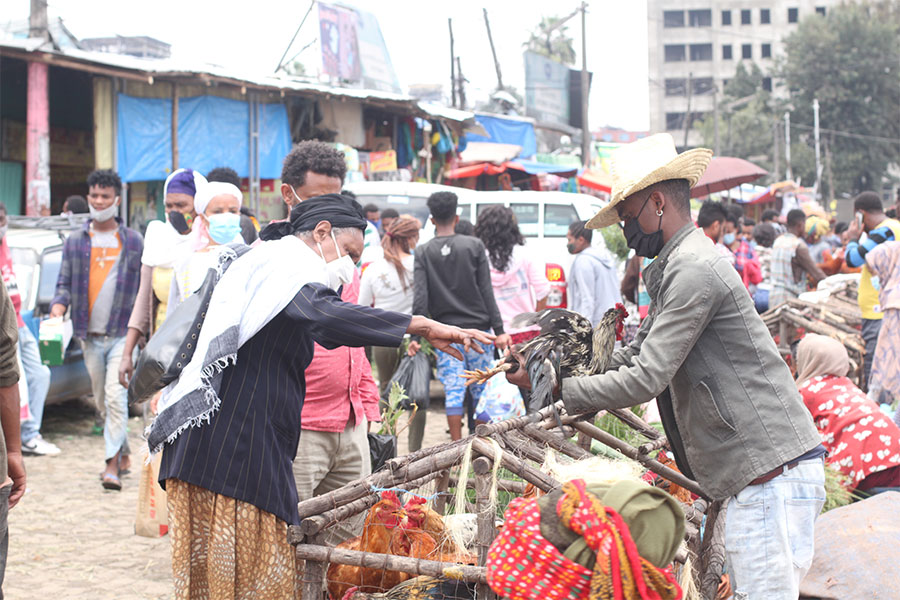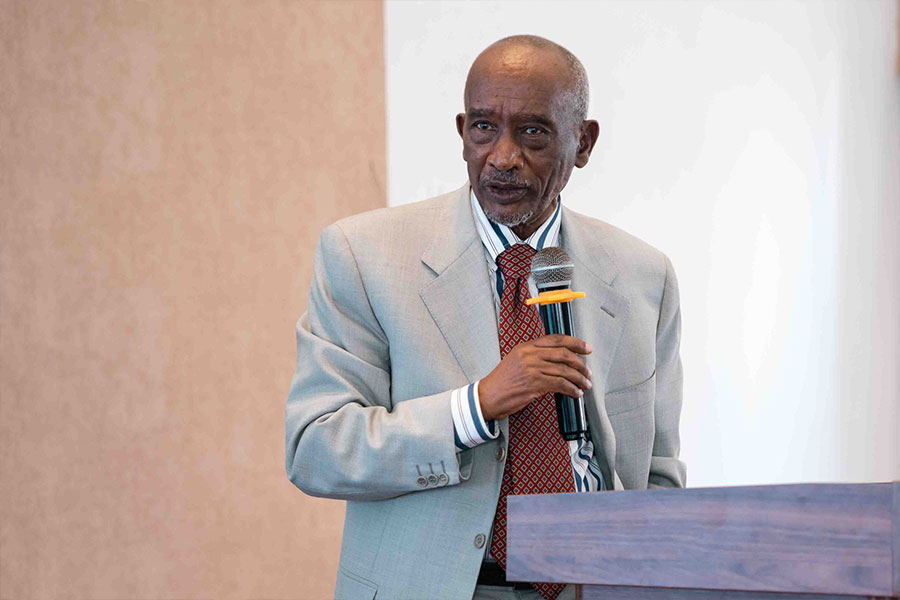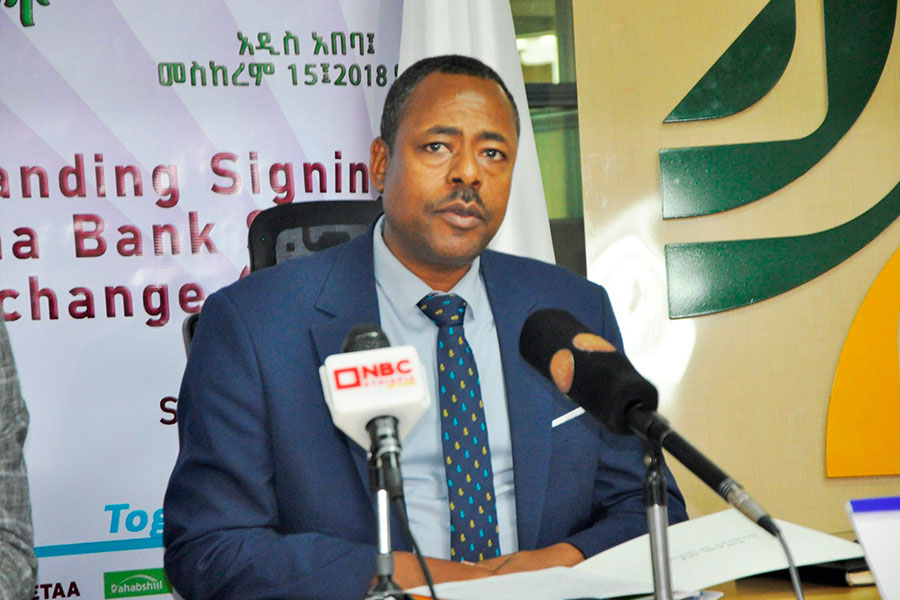
Viewpoints | Jun 05,2021
Aug 16 , 2025
By Mariana Mazzucato
More than 700 million dollars in annual subsidies for water and agriculture currently incentivise overuse and pollution. In this commentary provided by Project Syndicate (PS), Mariana Mazzucato, a professor of economics of innovation and public value at University College London, argued that redirecting such funds toward water-efficient agriculture and ecosystem restoration could transform the economics of water.
As African leaders gather in Cape Town for the African Water Investment Summit, there can be no equivocation that the world faces an unprecedented water crisis that demands a paradigm shift in how we value and govern our most precious resource.
The scale of the challenge is staggering. Over half the world's food production now comes from areas experiencing declining freshwater supplies. Two-thirds of the global population face water scarcity at least one month a year. More than 1,000 children under five die every day, on average, from water-related diseases. And if current trends continue, high-income countries could see their GDP shrink by eight per cent by 2050, while lower-income countries (many in Africa) face losses of 10pc to 15pc.
Yet, this crisis also presents an extraordinary opportunity. As South Africa assumes the G20 presidency (for which I have been appointed special adviser to President Cyril Ramaphosa), it can champion a new economics of water that treats the hydrological cycle as a global common good, rather than as the source of a commodity to be hoarded or traded.
The economic case for action is compelling. The International High-Level Panel on Water Investments for Africa shows that every one dollar invested in climate-resilient water and sanitation delivers a return of seven dollars. With Africa requiring an additional 30 billion dollars annually to meet the Sustainable Development Goal (SDG) on water security and sustainable sanitation, the financing gap is significant. But it is surmountable with the right strategy.
The Global Commission on the Economics of Water (which I co-chaired with Ngozi Okonjo-Iweala, the director-general of the World Trade Organisation, Johan Rockstrom, the director of the Potsdam Institute for Climate Impact Research, and Singaporean President Tharman Shanmugaratnam) recently called for such a strategy.
Treating water as a global common good and adopting mission-oriented approaches to transform the crisis into an opportunity requires that we recognise three critical facts.
Water connects us all, not merely through visible rivers and lakes, but through atmospheric moisture flows that travel across continents. The water crisis is inextricably linked to climate change and biodiversity loss, each of which exacerbates the other in a vicious cycle. And, water runs through every Sustainable Development Goal (SDG), from food security and health to economic growth.
Yet too often, water investments follow the failed playbook of climate and development finance. There is a tendency to derisk private capital without ensuring public returns; to fund projects without strategic direction; and to treat water as a technical problem, rather than a systemic challenge. Such approaches risk creating water infrastructure that serves investors more than communities, exacerbates existing inequalities, and fails to address the interconnected nature of the water, climate, and biodiversity crises.
This interconnectedness demands a new economic framework that aims to shape markets proactively rather than simply fixing failures after the fact. We need to shift from short-term cost-benefit thinking to long-term value creation, which calls for mission-oriented investments that shape markets for the common good.
Missions require clear goals, like ensuring that no child dies from unsafe water by 2030. Once goals are established, all financing can be aligned with them through cross-sectoral approaches spanning agriculture, energy, manufacturing, and digital infrastructure. Rather than picking sectors or technologies, the point is to find willing partners across all industries to tackle shared challenges. Such mission-oriented investments can also lead to economic diversification, creating new export opportunities and development pathways.
Consider Bolivia's approach to lithium extraction. Rather than simply exporting raw materials, the country is developing strategies to avoid the traditional "resource curse" by building domestic battery-production capabilities and participating directly in the energy transition. In doing so, it is converting its resource wealth into innovation capacity, strengthening value chains, and creating new export markets for higher-value activities.
More than 700 million dollars a year is channelled into water and agriculture subsidies that often incentivise overuse and pollution. By redirecting these resources toward water-efficient agriculture and ecosystem restoration, with clear conditions attached, we could transform the economics of water overnight. To that end, public development banks can provide patient capital for water infrastructure, while requiring private partners to reinvest profits in watershed protection.
Africa is uniquely positioned to lead this transformation.
Its vast supply of groundwater remains largely untapped, with 225 million urban inhabitants living above known supplies. Combined with affordable solar power, these supplies present an opportunity to revolutionise agriculture. By focusing on efficiency and reuse, as well as capacity building, data sharing, and monitoring and evaluation, this relatively stable groundwater resource, accessed by solar-powered pumps, can serve as a decentralised alternative, minimising the emissions, waste, and other environmental costs associated with larger infrastructure projects that disrupt natural water flows.
Through Just Water Partnerships, collaborative frameworks that pool such solar-groundwater projects for increased bankability while ensuring community ownership, international finance can be channelled toward water infrastructure that serves both national development goals and the global common good.
The African Water Investment Summit is not simply another gathering, but should be a watershed. This is the moment when we should shift from treating water as a local resource to governing it as a global common good, moving from crisis management to proactive market shaping and from viewing mission-oriented investment as a cost to recognising it as the foundation of sustainable growth.
South Africa's G20 presidency, the first ever for an African country, offers a historic platform to advance this agenda globally. Just as Brazil has used its G20 leadership and role as host of the upcoming United Nations Climate Change Conference (COP30) to drive climate action, South Africa can make water security central to the global economic agenda. With the 2026 UN Water Conference on the horizon, and with the international community recognising that climate change cannot be tackled without also addressing the water crisis, the time is right for bold leadership.
Water security underpins Africa's aspirations for health, climate resilience, prosperity, and peace. With young Africans set to constitute 42pc of global youth by 2030, investing in water is tantamount to investing in the world's future. The question is not whether we can afford to act, but whether we can afford not to.
PUBLISHED ON
Aug 16,2025 [ VOL
26 , NO
1320]


Viewpoints | Jun 05,2021

Radar | Nov 14,2020

Fortune News | May 11,2019

Agenda | Sep 11,2020

Radar | Mar 30,2019

Photo Gallery | 167773 Views | May 06,2019

Photo Gallery | 158018 Views | Apr 26,2019

Photo Gallery | 147368 Views | Oct 06,2021

My Opinion | 136065 Views | Aug 14,2021

Dec 22 , 2024 . By TIZITA SHEWAFERAW
Charged with transforming colossal state-owned enterprises into modern and competitiv...

Aug 18 , 2024 . By AKSAH ITALO
Although predictable Yonas Zerihun's job in the ride-hailing service is not immune to...

Jul 28 , 2024 . By TIZITA SHEWAFERAW
Unhabitual, perhaps too many, Samuel Gebreyohannes, 38, used to occasionally enjoy a couple of beers at breakfast. However, he recently swit...

Jul 13 , 2024 . By AKSAH ITALO
Investors who rely on tractors, trucks, and field vehicles for commuting, transporting commodities, and f...

Sep 27 , 2025
Four years into an experiment with “shock therapy” in education, the national moo...

Sep 20 , 2025
Getachew Reda's return to the national stage was always going to stir attention. Once...

Sep 13 , 2025
At its launch in Nairobi two years ago, the Africa Climate Summit was billed as the f...

Sep 6 , 2025
The dawn of a new year is more than a simple turning of the calendar. It is a moment...

Sep 27 , 2025
Meskel Square turned into a rolling wave of colour and sound on Friday, September 26, 2025, as thousands pressed toward the annual bonfire c...

Unity University has increased tuition fees sharply, jolting students and families alike, drawing critici...

Sep 27 , 2025 . By BEZAWIT HULUAGER
Seventeen years after its inception as a flagship market reform for agricultural modernisation, the Ethio...

Sep 27 , 2025 . By BEZAWIT HULUAGER
The elevator industry is bracing for sweeping reforms as construction regulators are to impose the first...